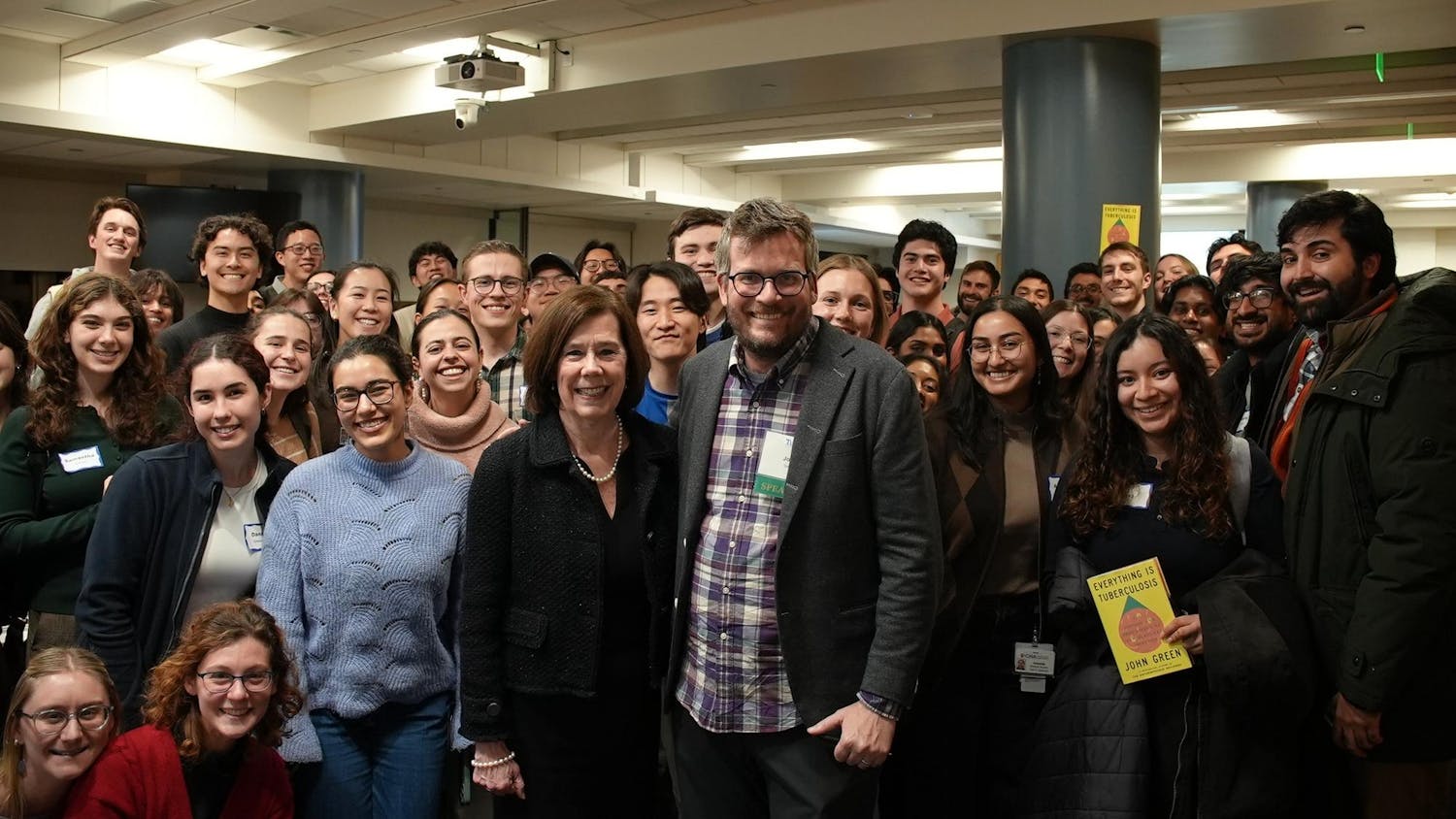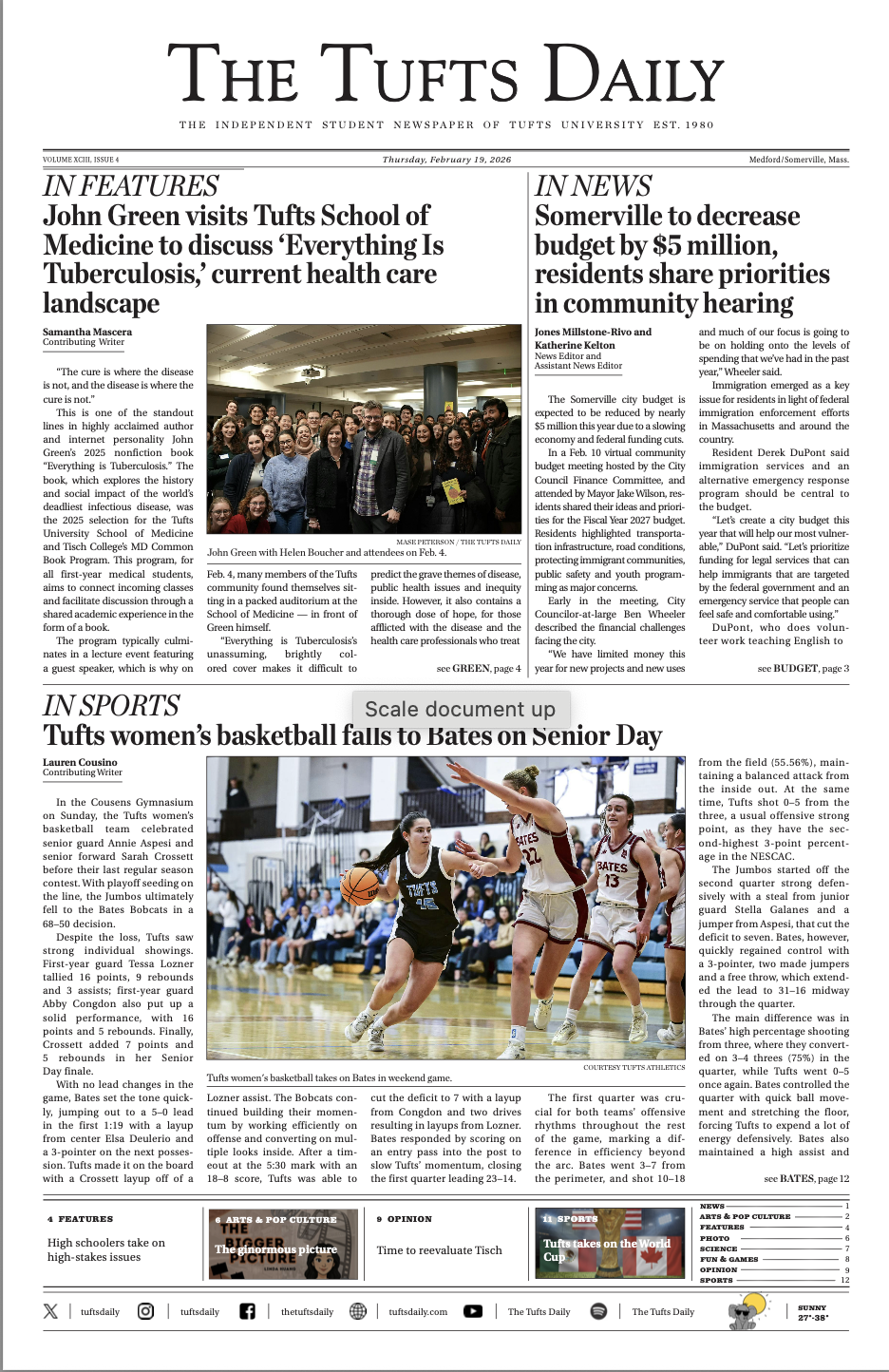After enduring dozens of textbook pages and required readings, leisure reading is not always the first activity to come to mind for busy Tufts students. Activities like watching television or listening to music may appear to be more effective at de-stressing after assigned reading and writing assignments.
However, Tufts students can often be found reading on President’s Lawn or enjoying a good book on the weekends.
Students may form negative associations with reading once it becomes required. Reading books for classes can be more like a job than a leisure activity. For this reason, humanities students in particular may choose not to spend their free time reading books.
Becca Kaplan, a senior majoring in English and political science, finds that some of her friends majoring in STEM fields read for leisure more often than she does.
“I think humanities majors honestly [read] less than I’ve seen biology majors and other people do because we have to do so much reading for our classes anyway,” Kaplan said.
For others, including professors, reading for leisure can be a helpful way to de-stress. Associate Professor of English Ichiro Takayoshi believes reading can be calming and relaxing.
“It’s about leisure. It’s about relaxation. It’s about taking you out of the rapid stream of busy daily activities,” Takayoshi said.
Takayoshi added that there are various ways to spend one’s leisure time, and believes that smartphones are the most popular approach.
“Right now, it might be the most pleasing thing to do for me — to look at my smartphone — but eight minutes later, I will regret it. At the end of the day, I will regret the way I spent my day,” Takayoshi said. “And then you have a great alternative. You just go anywhere with a book.”
Students that Takayoshi has taught read a wide variety of books, with no one genre or style known to trump the others in popularity. He added that this diversity in reading preferences creates a diverse and enthralling reading culture on campus.
“It’s all over the map, it’s unpredictable,” Takayoshi said. “That makes me, actually, quite hopeful and optimistic about young readers. I think it’s a good thing that we have this diversity of tastes in terms of what they like,” Takayoshi said.
According to Kaplan, memoirs and biographies like “Crying in H Mart” (2021) by Michelle Zauner and “Educated” (2018) by Tara Westover currently seem to be popular choices among fellow Tufts students.
“I recently read ‘Crying in H Mart,’ which I feel like everyone has been reading, but it’s 100% worth a read. I really liked it,” Kaplan said.
Poetry, albeit less popular amongst the undergraduate-aged demographic, is also persistent in drawing readers.
Professor Takayoshi suggested that Tufts students should read more poetry, and he often recommends the work of Wallace Stevens.
“Wallace Stevens … is one of the most highly regarded American poets of the 20th century,” Takayoshi said.
Takayoshi also noted that Stevens’ whimsical yet dark work can be beneficial in expanding and challenging students’ worldviews.
“I like to see things that are quite far away from my students’ immediate life concerns, and it's hard to find an author whose work is farther from your immediate, urgent concerns than Wallace Stevens,” Takayoshi said.
Poetry can present a good reading choice because its brevity can make it fit more easily into packed schedules.
Marie Manassee, a senior majoring in English, said that poetry is more accessible reading that is not time consuming for humanities students that have a lot of required reading for classes.
“I think poetry is just a lot easier to read. So if you are a humanities major, I feel like you would more likely go towards a short poem by Emily Dickinson, or something like that. Something short and quick that you can read in three seconds,” Manassee said.
Another recommended book topic for humanities students is science. For Takayoshi, reading STEM-focused books is a powerful way for humanities majors to step outside of their usual studies and learn about other aspects of academia.
“For most of us who are not scientifically gifted, I think [reading books about science] is a wonderful way and a neglected way to understand and to appreciate what is being done by these other, more scientifically gifted people every day or in the past,” Takayoshi said.
Stepping outside day-to-day concerns is also a common reason for leisure reading. Fantasy and fiction are popular genres amongst readers, allowing them to escape a sense of monotony and focus on something unique.
Manassee highly recommends reading two books authored by Celeste Ng, “Little Fires Everywhere” (2017) and “Everything I Never Told You” (2014). A book that Kaplan always recommends is “The Handmaid’s Tale” (1985) by Margaret Atwood. Both Manassee and Kaplan emphasized that readers should enjoy “Little Fires Everywhere” and “The Handmaid’s Tale” in print before watching their television adaptations.
While leisure reading may seem to be a solitary activity, it can also be a means for interpersonal connection. Learning about a friend’s reading tastes can help people get to know one another better. After all, asking about someone’s favorite book is a common icebreaker for a reason.
Julia Bartie, a senior majoring in English, spent time in a book club with family members and found that it was a dynamic and engaging way to learn more about others.
“Reading a book with a group of people and talking about it can be a really great social experience,” Bartie said. “It’s good to hear other people’s interpretations of the book and what they got out of it.”
Bartie, Kaplan and Manassee are all members of the Tufts English Society, a new student organization on campus.
Kaplan said many club members often incorporate reading into their routines to de-stress.
“So many people [in the Tufts English Society] were saying how it’s such a great mental health support. Even just reading a few pages every day is super helpful and relaxing,” Kaplan said.
Takayoshi reiterated the benefits that reading provides to students.
“I think the biggest reason why young people should read books is not because they are not learning enough facts,” Takayoshi said. “What they’re doing less today is enjoying themselves by engaging in a truly relaxing leisure activity, and reading can be that.”






